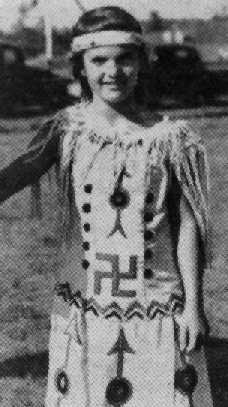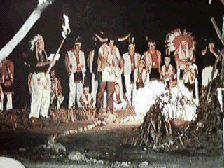 Another Stereotype of the Month entry:
Another Stereotype of the Month entry:
 Another Stereotype of the Month entry:
Another Stereotype of the Month entry:
From the Chicago Sun-Times, 12/1/03:
December 1, 2003
BY PAIGE WISER SUN-TIMES COLUMNIST
Chief Illiniwek is getting all the press, but the issue of what's culturally correct is more pervasive than that. You can hear the war cry at any YMCA: Native Americans are protesting their remaining Indian Guides and Indian Princesses programs.
They say that the parent-child activities, which include campouts and diluted takes on traditional rituals, are insulting. In short: Those feathers are not just meant to be fashion statements.
So in 2001, the national YMCA urged it members to instead become Adventure Guides. "Braves" and "princesses" have become "explorers." "Tribes" have become "circles." Forget about crafts that incorporate wacky totem poles.
Except that some of the participants are offended that the Native Americans are offended. A Naperville chapter refuses to convert, and retains the Indian Guides and Princesses name. Other parents have split from their YMCAs altogether to carry on the program.
How important is the Indian theme?
When I was a tot, my dad and I joined the neighborhood Crow Tribe with a number of my little friends. They were renamed thusly: Little Fawn, Little Bunny, Little Bird. I was renamed Babbling Brook.
There were some half-hearted attempts to honor the Native American way of life. At one point, I'd learned how to identify about 10 trees from their leaves. I've forgotten all that stuff now, but that's not to say that the program wasn't educational. Here are some of my more vivid memories, and the Important Lessons I learned from them.
* During each campout, there was a contest to design a patch for our "authentic" Indian vests. I always got my dad to sketch my patch for me. We pulled out all the stops: We used magic marker rather than pedestrian crayons; we kept the design clean and simple, and then we glued a liberal smattering of multicolored glitter. We won every time.
Moral: Little girls are suckers for glitter.
* During one trip, my dad engineered an impromptu pancake-eating contest among the girls, knowing full well that I would win. I'm not even sure I used my hands. Dad cleared about 20 bucks.
Moral: There's nothing wrong with cashing in on your special talent.
* During our last year, we learned that we would soon be too old to qualify as Princesses. "But Daddy!" we all chorused. "We could sign up for Indian Maidens!" I would describe the looks on our fathers' faces as "stricken."
Moral: There is such a thing as too much fun.
I confess I don't understand why some Native Americans are so irate about the Indian Princesses. Considering some of the injustices in their past, I'd think they have bigger palefaces to scalp than suburban dads in headdresses.
But I have tried to look at it from their point of view. Ethnic stereotypes can be offensive, certainly. For instance: I am predominantly Polish-Irish. The Polish, you may have heard, are not considered to be particularly intelligent. And the Irish — at least at Notre Dame — are represented by a short, angular, angry cartoon leprechaun. None of this is exactly flattering.
But these generalities have never bothered me. I know who I am, and I don't see how a dumb joke — or a losing football team — can diminish that.
I suppose that pre-adolescent girls with lipstick war paint, hopping around on one foot while hooting, is not an entirely respectful tribute to the noble history of Native Americans. I suppose that a name change shouldn't be that big a deal.
But more than anything, I remember Indian Princesses as a precious chance to spend time with my dad.
It seems to me that any ethnicity would be proud to be associated with a program like that.

Rob's comment
Wiser proves she hasn't learned much sensitivity. Phrases such as "You can hear the war cry" and "I'd think they have bigger palefaces to scalp" are insulting to many. The latter is particularly offensive because it suggests Indians were savage killers. In reality, Anglos killed them much more often than they killed Anglos.
In fact, Wiser proves she hasn't learned much of anything. She can't remember a single piece of Indian lore she supposedly learned. She thinks there's little or nothing wrong with "wacky totem poles," "lipstick war paint," and "hopping around on one foot while hooting." The "lessons" she does remember have nothing to do with Indian culture and everything to do with being a spoiled girl.
She parades more ignorance by comparing Indians to the Polish and the (fighting) Irish. As Ishgooda comments, "Note the continued comparison to 'ethnic' groups, rather than political, racial or distinctive separate sovereign nations. The entire argument seeks to reduce the status of our nations to 'just another ethnic group'....
"I believe the real question is: 'Why do you find nothing within your own culture to emulate that brings your families together?'"
See Fighting Sioux vs. Fighting Irish for some problems with Wiser's comparison.
Even odder is Wiser's assertion that Indians should be proud to be associated with a program that encourages superficiality, competitiveness, and "cashing in." She makes her Indian Princesses progam sound a lot worse than professional and amateur sports teams, and many Indians don't want to be associated with them. See Smashing People: The "Honor" of Being an Athlete for more on the subject.
Ironically, Wiser demonstrates why the YMCA program should go. Her experiences in the program haven't made her any "wiser." Despite her "proud" participation, she knows nothing about Indians except the stereotypes she learned with her dad. In short, she's written a great anti-YMCA piece in the guise of a pro-YMCA piece.
Related links
The trouble with face-painting
YMCA-Indian Guides
Team names and mascots
|
. . . |

|
All material © copyright its original owners, except where noted.
Original text and pictures © copyright 2007 by Robert Schmidt.
Copyrighted material is posted under the Fair Use provision of the Copyright Act,
which allows copying for nonprofit educational uses including criticism and commentary.
Comments sent to the publisher become the property of Blue Corn Comics
and may be used in other postings without permission.